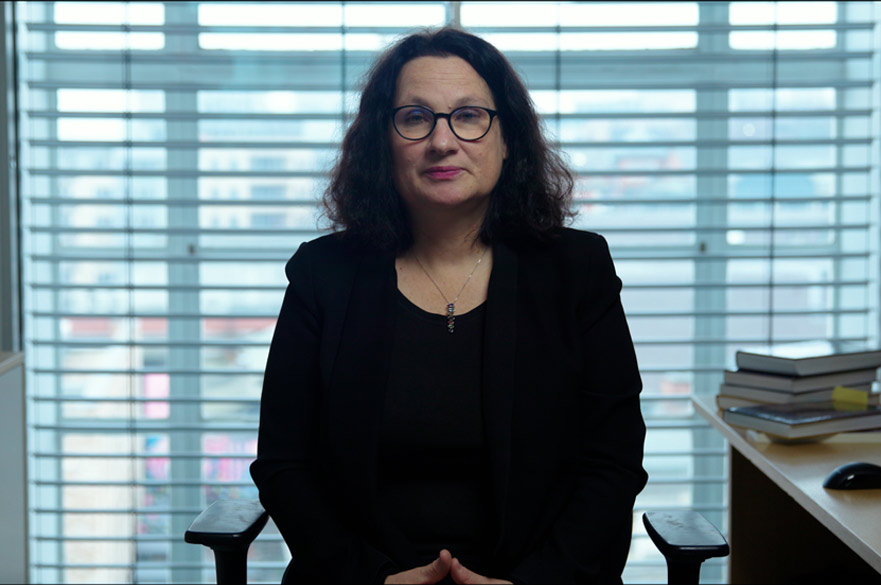Breaking the cycle: preventing human rights violations
Blerina Kellezi, Associate Professor
The Kosovo war was a devastating conflict in the late 90s which killed more than 10,000 people and displaced more than 1 million Kosovo Albanians. Being a Psychology student, I wanted to help – so I volunteered in a refugee camp where I observed the different coping strategies used by the refugees. I saw a young man enthusiastically preparing to go back to Kosovo to join the liberation army, which was a strong contrast to other refugees who were scared, but relieved to have found safety.
My research journey
Before starting my research career, I spent five years working for several environmental and health charities and UN agencies on mental health projects. This included work in a refugee camp in Albania In 1999. The duality of responses to the same traumatic events I witnessed there, was one of the key inspirations for my research, as it made me want to understand more about how people cope with trauma and human rights violations.
Today, I am driven by a duty – that I believe applies to all of us – to understand what leads to these violations in the first place, and to find ways that we can collectively address their impact and prevent them in the future.
My research investigates how people collectively deal with, and are affected by, mass human rights violations. Examples of this work include investigating vulnerabilities and resilience to trauma in post-war Kosovo, the dictatorship in Albania, witch-hunting in Gambia, and immigration detention in the UK.
I have conducted over a thousand interviews with individuals who have experienced these severe violations and trauma. Speaking to these individuals has helped me to understand the depth and complexity of human experiences. I witnessed the depth of harm we can do to each other, but I also saw the many ways we can work together to support each other.
Working with survivors has inspired me to take a holistic and interdisciplinary approach to understand their experiences and their strategies for coping, so that we can bring about real change. My psychological work in this area is very much informed by history, politics, sociology, human rights, and even art and literature.
Using survivor's stories to improve our future
My research is investigating how we can collectively address the impact of human rights violations on the health, social, economic, political, civil and cultural lives of those affected. I am interested in how we can collectively build families, communities, nations, and a world that understands and prevents harm, inequalities and discrimination in the present and for future generations. I want us to build a fairer, healthier and happier society together.
What fascinates me about my area of research is the amazing resilience of survivors, and their fight for justice. I am also captivated by the power of social connections – such as communities, families and other groups – even in extraordinary circumstances. This is especially visible when it comes to acting together to redress harms and bring about systemic changes to prevent or minimise abuse.
I’ve been lucky enough to work collaboratively with some wonderful colleagues and organisations to help survivors of human rights violations by creating widespread strategies to redress past harm, and prevent future harm. These collaborations have been essential to develop research ideas that inform practice and policy and make a real difference to people’s lives.
Recently, I have been working with the Institue for the Study of Crimes and Consequences of Communist Crimes in Albania where we have discussed what should happen with communist architecture and cultural artefacts. On the one hand, they help us understand the way the communist regime managed to create and maintain fear and control of the population, and on the other hand, they are reminders of violence and can trigger past traumas for the victims. Through my work, I am able to provide recommendations to ensure that objects like these are given clear labelling to explain their role in the violence towards their victims.
Documenting harm is very important for survivors to achieve justice. In a recent project aimed at raising awareness about the Kosovo war and its outcomes, me and my research collaborators have developed a documentary with survivors to share their stories. I have always felt that survivors’ stories should become testimonies to be widely shared with others so that we can learn from our past and improve our future. We’re hoping to take this film to different film festivals in the next year or so.
My work has shifted the way I now see the world, and it motivates me to continue searching for strategies that can bring about change. Sadly, there is still a lot of work that needs to be done to understand the many forms that human rights violations take, and their impact. But I am really hopeful that the work I and many others are doing to document the causes and consequences of past harm can help us prevent harm in the future.
Follow my story
My story doesn’t end here. Keep up to date with me and my research by keeping an eye on my academic profile or following me on Twitter @Blerina_Kellezi. For anything else, please feel free to email me on blerina.kellezi@ntu.ac.uk.
Blerina Kellezi
Blerina is an Associate Professor in the School of Social Sciences. Blerina's research investigates how people collectively deal with and are affected by extreme life events from illness and accidents to war, torture and immigration detention.
Meet the researchers
Forget lab coats and research papers. It's time to get personal. Meet the people behind the research and uncover fascinating truths about their experiences.

Ursula F. Ott
International decision making
Learn how Ursula is connecting cultures to improve business negotiations
Richard Arm
Real lives, fake organs
Explore how Richard is using his visual effects background to save lives